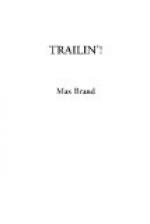“Mighty comfortable, sir.”
The big man stood with his hands clasped behind him, peering down under shaggy, iron-grey brows.
“I thought it would be. I designed it myself for you and I had a pretty bad time getting it made.”
He stepped to one side.
“Hits you pretty well under the knees, doesn’t it? Yes, it’s deeper than most.”
“A perfect fit, father, and mighty thoughtful of you.”
“H-m,” rumbled John Woodbury, and looked about like one who has forgotten something. “What about a glass of Scotch?”
“Nothing, thank you—I—in fact I’m not very strong for the stuff.”
The rough brows rose a trifle and fell.
“No? But isn’t it usual? Better have a go.”
Once more there was that slight touch of hesitancy, as if the son were not quite sure of the father and wished to make every concession.
“Certainly, if it’ll make you easier.”
There was an instant softening of the hard lines of the elder Woodbury’s face, as though some favour of import had been done him. He touched a bell-cord and lowered himself with a little grunt of relaxation into a chair. The chair was stoutly built, but it groaned a little under the weight of the mighty frame it received. He leaned back and in his face was a light which came not altogether from the comfortable glow of the fire.
And when the servant appeared the big man ordered: “Scotch and seltzer and one glass with a pitcher of ice.”
“Aren’t you taking anything, sir?” asked Anthony.
“Who, me? Yes, yes, of course. Why, let me see—bring me a pitcher of beer.” He added as the servant disappeared: “Never could get a taste for Scotch, and rye doesn’t seem to be—er—good form. Eh, Anthony?”
“Nonsense,” frowned the son, “haven’t you a right to be comfortable in your own house?”
“Come, come!” rumbled John Woodbury. “A young fellow in your position can’t have a boor for a father, eh?”
It was apparently an old argument between them, for Anthony stared gloomily at the fire, making no attempt to reply; and he glanced up in relief when the servant entered with the liquor. John Woodbury, however, returned to the charge as soon as they were left alone again, saying: “As a matter of fact, I’m about to set you up in an establishment of your own in New York.” He made a vastly inclusive gesture. “Everything done up brown—old house—high-class interior decorator, to get you started with a splash.”
“Are you tired of Long Island?”
“I’m not going to the city, but you will.”
“And my work?”
“A gentleman of the class you’ll be in can’t callous his hands with work. I spent my life making money; you can use your life throwing it away—like a gentleman. But”—he reached out at this point and smashed a burly fist into a palm hardly less hard—“but I’ll be damned, Anthony, if I’ll let you stay here in Long Island wasting your time riding the wildest horses you can get and practising with an infernal revolver. What the devil do you mean by it?”




